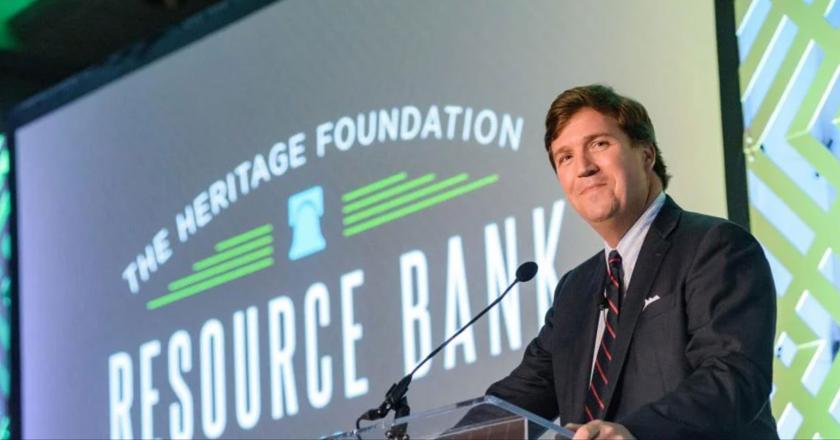A civil war has been brewing in the MAGA movement. Tucker Carlson and Nick Fuentes, by popular mandate, have become the standard-bearers for “America First,” with their anti-Zionist rhetoric putting them in the hot seat. Long-time GOP figureheads are ferociously pushing back against this rising populist force in American politics. Accusations of antisemitism are flying, and Republicans are divided between America’s close relationship with Israel and a growing frustration with foreign aid and Israel’s handling of the Gaza war.
SKEPTICAL TOWARD ISRAEL
The relationship between America and Israel has remained largely unquestioned in American politics until the Gaza War, where Israel became mired in controversy because of its military policy that put the civilian population of Gaza within the lines of fire and restricted humanitarian aid entering the territory. The growing unpopularity of Israel due to its actions in the war has led many young Republicans, as well as an America First faction, to become increasingly skeptical of America’s commitments to Israel.
The America First faction of the MAGA movement has its intellectual roots in the Monroe Doctrine, which emphasized American non-interference in European affairs and warned against entanglements in foreign conflicts outside the Western Hemisphere. This period of history has fostered a tradition of isolationism that prioritizes domestic interests over global engagements, and has seen a resurgence of popularity in recent years.
Opposition to Israel has been growing within the Republican Party, particularly among younger voters. A March 2025 Pew poll revealed that 50% of GOP voters under 50 hold a negative view of Israel, up from 35% in 2022. The GOP has been facing a generational divide driven by fatigue from Middle East entanglements and a lack of focus on domestic priorities. This evolving sentiment clashes with traditional GOP neoconservative support for Israel, and has been fueling the Nick Fuentes-led America First pushback.
America First approaches foreign policy far more tepidly than the neoconservatives who have dominated the GOP since the Reagan era. America First has an instinct towards isolationism, especially as many of its supporters grew up during the Global War on Terror and witnessed the “blowback” effects of American nation-building in the Middle East. Israel’s role in American interventions in the Middle East has come under increasing scrutiny by these voices.
Isolationists see Israel as an obstacle to navigating American foreign policy away from the Middle East, which, as Cato’s Leon Hadar predicted in 1992, has become a quagmire of endless conflicts. The younger generation of Republicans does not want to repeat the mistakes made in Iraq and Afghanistan, and wants to focus America’s attention inward. The recent escalation with Iran at Israel’s behest has also contributed to the rising popularity of isolationism.
AVALANCHE OF CONDEMNATION OVER “WHITEWASHING” FUENTES
Tucker Carlson platforming Nick Fuentes on his podcast, as a representative of these views, has been seen as a bridge too far for many in the GOP. On October 27, 2025, the podcast aired, with Tucker discussing with Nick the problems they see with the Israel lobby. Republican commentators were quick to pick sides, and the lines in the sand have been drawn.
Senators Ted Cruz and Mitch McConnell also came out with harsh words for Tucker. McConnell also blasted the Heritage Foundation saying, “Last I checked, ‘conservatives should feel no obligation’ to carry water for antisemites and apologists for America-hating autocrats.” Ben Shapiro took to his podcast to denounce Tucker Carlson for “normalizing and fluffing Nick Fuentes,” who is a “Hitler apologist.” Shapiro further accused Carlson of being “an intellectual coward, a dishonest interlocutor, and a terrible friend.”
Mark Levin, a former talk radio host and now Fox News anchor, gave an especially thunderous speech at the Republican Jewish Coalition’s Annual Leadership Summit in Las Vegas on November 1, 2025, where he lambasted Tucker Carlson, Nick Fuentes, Candace Owens, Steve Bannon, and others as “mentally unhinged bigots” and “Jew haters” who are “sick” for their anti-Zionist views, declaring, “That’s not America First. That’s sick!” He demanded the cancellation of numerous populist voices accused of promoting antisemitism and undermining conservative unity.

REPUBLICAN THINK TANK BACKING TUCKER
Levin’s declaration of war hints at trouble in paradise as the midterm election cycle looms. His trepidation about the direction of the party is shared by others, who have noted a shift in the conservative populist movement. Dinesh D’Souza, longtime Trump supporter and conservative filmmaker, has noticed a nativist trend that could spell trouble for the future of a party that has made massive gains with minority voters. Meanwhile, the Heritage Foundation, a key Republican think-tank tightly wound with GOP policy-making since the Reagan administration, has offered support to Tucker Carlson. Foundation president Kevin Roberts denounced the pro-Israel lobby as a “venomous coalition,” accusing them of “sowing division” within the party.
This has created turmoil within the Heritage Foundation itself. Kevin Roberts announced there will be staff shakeups at Heritage. He acknowledged that Nick Fuentes does not represent the views at Heritage, but declared that canceling him is not the solution. Roberts emphasized that conservatives must hold a principled stance against cancel culture. Ryan Neuhaus, Kevin Roberts’s chief of staff, resigned from the organization on Monday, November 3, 2025, along with lawyer Mark Goldfeder, who was part of the foundation’s National Task Force to Combat Antisemitism. Staffers Richard A. Stern and Preston Bashers posted on X in protest of Roberts’ speech.
Not everyone has found Kevin Roberts’s explanation satisfactory, with the Zionist Organization of America demanding his immediate resignation: “Unless Kevin Roberts retracts and apologizes for his praise for Jew-hating Israel-basher Tucker Carlson … and publicly condemns and ends Heritage Foundation’s relationship with Tucker Carlson, Roberts is not fit to continue as Heritage Foundation’s president,” the ZOA declared.
FOR AND AGAINST ISRAEL – A CONFLICT THAT BODES ILL
Trump, while having at times a contentious relationship with Benjamin Netanyahu, has affirmed that he will support the prime minister in his upcoming corruption trial. As of writing, Trump has not commented publicly on the matter, but his close confidant, Steve Bannon, has spoken to the Daily Mail suggesting that all this trouble is worth moving the party away from Israel, and highlighted a debate where Nick Fuentes “destroyed” Dinesh D’Souza in a debate on Israel.
The question remains how the broader American public may react to these controversies as the midterm elections loom with primaries approaching and the campaign season beginning in earnest next spring. This internal conflict arriving on the heels of a government shutdown may not bode well for the Republicans, who now must contend with a polarizing divide that has brought out considerable vitriol from America First’s detractors. Those critics tread recklessly into an electorate whose opinions on Israel have been shifting in recent years.
Newer pollster SoCal Strategies has performed the first public polling on Nick Fuentes’s public favorability with a sample size of 700 participants and found his approval rating lies at just 6% national favorability, with 33% holding an unfavorable opinion, and 61% unsure. A recent Rasmussen survey echoes this, showing only 4% with a very favorable view, while 53% have never heard of him or lack enough information to form an opinion.
WHAT THE POLLS SAY
Republicans have a more favorable view of Israel than Democrats, with support remaining strong—Gallup polling from July 2025 found 67% of Republicans viewing Israel favorably—but moderates have been increasingly unhappy with American policy toward Israel. Recent Pew data from October 2025 shows 39% of Americans overall believe Israel has gone too far in its military operations against Hamas, up from 31% a year prior, with 59% holding an unfavorable view of the Israeli government.
Among Republicans, approval of Trump’s handling of the Israel-Hamas conflict stands at 80% according to Emerson College Polling, yet broader surveys like the New York Times/Siena poll indicate a near-even split nationally, with 34% siding with Israel and 35% with Palestinians in the conflict.
Meanwhile, Israel has become an increasingly important issue for Americans, with $21.7 billion in military aid sent since October 2023 according to reports from the Quincy Institute and Costs of War Project. Despite the importance of this issue for the electorate, neither party has managed to provide effective messaging around the topic, allowing the fringe to speak for them while carrying on with business as usual at the top rungs of government.
While this change in the winds for MAGA might be able to garner some support from moderates, it’s questionable whether the personalities serving as a vehicle for this message will be well-received by the American public. Moderates might not be so warm to the nativist sentiments that have become a major part of the MAGA movement with Nick Fuentes’ surge of popularity.
According to a PRRI poll this month, 60 percent of Americans believe that the state of race relations in the U.S. has mostly worsened since the beginning of the year and Trump’s return to Washington. The same PRRI American Values Survey highlights record levels of alienation among Black and Latino Americans, with 62% overall saying the country is headed in the wrong direction, contributing to broader pessimism.
Trump’s approval ratings have been dropping since the messy rollout of his tariff regime, hitting a second-term low of 37% in recent CNN/SSRS and Economist/YouGov surveys, with net approval dipping to -8.9 points in aggregators. Furthermore, the internal division in the MAGA movement might signal instability to voters and may drive moderates towards the Democrats.
THE DEMOCRATIC PARTY ISN’T SHINING EITHER
Things are not looking great across the aisle in the Democratic camp either. The party has attempted to prop up Gavin Newsom as the primary opposition to Trump, to no avail. Newsom’s approval ratings have hovered around 55% in recent statewide and national polls, such as those from PPIC and UCI-OC, reflecting a rebound amid economic challenges in California and his clashes with Trump. The Democrats have been unable to find effective messaging to rally support around this new figurehead for their party.
Zohran Mamdani emerged as the Democratic candidate with strong indicators of local support in New York, where he led by double digits in mayoral polls — up to 25 points ahead of Andrew Cuomo in Emerson surveys — but he held a low favorability rating at the national level, often below 20% in broader polling. AOC and Bernie Sanders endorsed his campaign, but the kind of politics pursued by the new mayor of New York does not appear to be a strategy capable of putting the Democrats back on the path to electoral success.
Voters are polling to put the economy and immigration at the top of importance for the midterms, with foreign policy issues like Israel trailing behind but gaining traction among younger voters. NBC and CNN polls one year out show Democrats holding an enthusiasm edge, with frustration over Trump and economic conditions giving them an early lead in congressional preferences, though 71% rate the economy as poor in CNN surveys. Pew’s pre-midterm survey notes dim views of both parties, with economy, immigration, and foreign policy as priorities, while ABC News/Ipsos data blames Trump for inflation, boosting Democratic momentum. Mint reports Democrats leading 47% to 42% in generic ballots, amid declining Trump support.
A TIGHT ELECTION BATTLE LIES AHEAD
We can expect these divisions to intensify as the campaign season heats up, potentially reshaping the Republican Party’s future trajectory. Historically, such internal conflicts have led to electoral setbacks, as in past midterms, party unity was seen as key to retaining power. If unresolved, this could alienate key voter blocs, including Jewish conservatives and moderates wary of extremism. On the flip side, it might energize a base tired of endless foreign entanglements, mirroring the anti-war sentiments that fueled Trump’s initial rise. It’s clear that Israel remains an important topic for many concerned Americans.
As the 2026 midterm elections approach, both Republicans and Democrats are mounting aggressive redistricting campaigns, setting the stage for a razor-thin contest amid historically low favorability ratings for the second consecutive cycle. Tensions are running high across the political divide, with analysts forecasting subdued voter turnout. Ultimately, the outcome may hinge on how these tensions unfold in pivotal swing districts, where foreign policy debates overlap with everyday kitchen-table issues.





